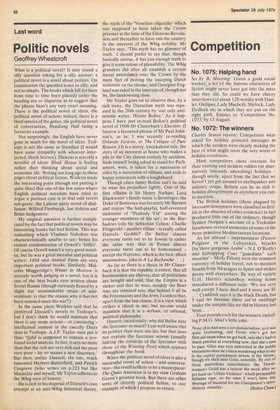Last word
Politic novels
Geoffrey Wheatcroft
What is a political novel? It may sound a silly question asking for a silly answer: a political novel is a novel about politics. On examination the question is not so silly, and not so simple. The books which fall (or have from time to time been placed) under the heading are so disparate as to suggest that the phrase hasn't any very exact meaning. There is the political novel of ideas, the political novel of action; indeed, there is a third species of the genus, the political novel of conversation, Headlong Hall being a favourite example.
Not surprisingly, the English have never gone in much for the novel of ideas. Trollope is not the same as Stendhal (I would have some sympathy with whoever interjected, thank heaven). Dickens is scarcely a novelist of ideas: Bleak House is feeling rather than thinking about social and economic life. Writing not long ago in these pages about political fiction, Watkins made the interesting point (though not putting it quite thus) that one of the few areas where English political novelists have tried to argue a partisan case is in that odd recent sub-genre, the Labour party novel of disillusion: Wilfred Fienburgh, Joe Ashton and Brian Sedgemore.
My original question is further complicated by the fact that political novels may be interesting books but bad fiction. This was something which Vladimir Nabokov was characteristically unable to see: hence his violent condemnation of Orwell's 'fables'. Of course Orwell wasn't a very good novelist, but he was a great moralist and political writer: 1984 and Animal Farm are very important political books. Similarly, Malcolm Muggeridge's Winter in Moscow is scarcely worth judging as a novel, but it is one of the best books ever written about Soviet Russia (though curiously flawed by a slight but unmistakable strain of antisemitism: is that the reason why it has not been reissued since the war?) In the same piece Watkins said that he preferred Disraeli's novels to Tro!lope's, but I don't think he would maintain that there is any more serious or convincing intellectual content in the rascally Dizzy than in Trollope. A.J.P. Taylor once put it thus: 'Sybil is supposed to contain a profound social analysis. In fact, it says no more than that the rich are very rich and the poor very poor by no means a new discovery.' But then, unlike Disraeli, the late, much lamented Herbert Butterfield. and Patrick Cosgrave (who writes on p.22) but like Macaulay and myself, Mr Taylor adheres to the Whig view of history.
He is deft in his disposal of Disraeli's own attempt at an anti-Whig historical theory, the myth of the 'Venetian oligarchy which was supposed to have taken the Crown prisoner at the time of the Glorious Revolution and thereafter to have run the country in the interests of the Whig nobility. Mr Taylor says, 'This myth has no glimmer of truth.' I should prefer to say that, though basically untrue, it has just enough truth to give it some colour of plausibility. The Whig grandees did after all establish a certain moral ascendancy over the Crown by the mere fact of putting the usurping Dutch sodomite on the throne; and Georgian England was ruled in the interests of, though not by, the landowning class.
Mr Taylor goes on to observe that, by a rich irony, the Disraelian myth was repeated in the 20th century by 'our only antisemitic writer, Hilaire Belloc.' As it happens I have just re-read Be!toe's political novel of 1908 Mr Clutterbuck's Election. (I borrow a favoured phrase of Mr Paul Johnson's, as in: I was recently re-reading Orlando Furioso, or The Critique of Pure Reason.) It is a merry, knockabout tale, the story of an innocent at home who makes a pile in the City almost entirely by accident, finds himself being asked to stand for Parliament, wins, is taken for a succession of rides by a succession of villians, and ends in happy retirement with a knighthood.
Though often funny Belloc can't be said to wear his prejudices lightly. One of the first villains is Sir Henry Nathan; Lord Blackwater's family name is Benzinger; the Duke of Battersea was formerly Mr Barnett and enjoys 'the half-playful, half-reverend nickname of "Peabody Yid" among the younger members of his set'; in the Barbadoes toils Sir Sebastian Cohen; Charlie Fitzgerald another villian is really called Daniels. Geddit? (In Belloc almost everyone turns out to be Jewish in rather the same way that in Proust almost everyone turns out to be homosexual except the Narrator, which is the best, albeit unconscious, joke in A La Recherche . . . ) As far as there is a thesis in Mr Clutterbuck it is that the republic is rotten, that all businessmen are thieves, that all politicians are bought and sold, that the Empire is a racket and that its wars, notably the Boer war, are criminal acts, that behind it all lie the Freemasons and the Jews. I confess that, apart from the last clause, it is a view which strikes a chord in me; but no-one could maintain that it is a serious, or rational, political philosophy. Quaere, incidentally: why did Belloc hate the Spectator so much? I am well aware that its politics then were not his, but that does not explain the facetious venom (usually linking the opinions of the Spectator with those of the Winning Post) which appears throughout the book.
When the political novel of ideas is also a successful novel of action and conversation the result is likely to be a masterpiece: The Quiet American is in my view Graham Green's greatest book. But there are other sorts of directly political fiction, to one example of which I propose to return.






































 Previous page
Previous page